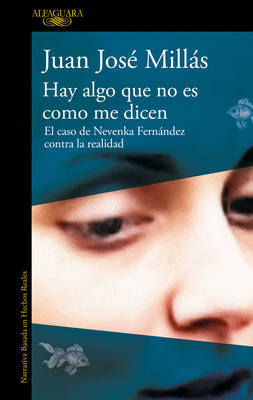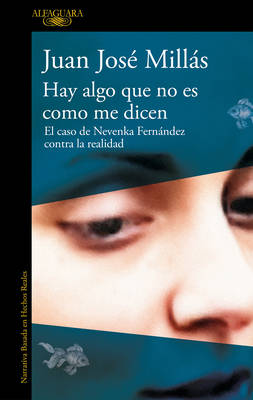
En raison d'une grêve chez bpost, votre commande pourrait être retardée. Vous avez besoin d’un livre rapidement ? Nos magasins vous accueillent à bras ouverts !
- Retrait gratuit dans votre magasin Club
- 7.000.000 titres dans notre catalogue
- Payer en toute sécurité
- Toujours un magasin près de chez vous
En raison de la grêve chez bpost, votre commande pourrait être retardée. Vous avez besoin d’un livre rapidement ? Nos magasins vous accueillent à bras ouverts !
- Retrait gratuit dans votre magasin Club
- 7.000.0000 titres dans notre catalogue
- Payer en toute sécurité
- Toujours un magasin près de chez vous
Description
EL LIBRO EN EL QUE SE INSPIRA LA PELÍCULA DE ICÍAR BOLLAÍN SOY NEVENKA
«Esta es la historia de una mujer sensata que, cuando se dio cuenta de que todo lo que le habían contado era mentira, fue al juzgado, denunció los hechos y lo puso todo patas arriba». Hace casi veinticinco años, Nevenka Fernández, concejal de Hacienda de Ponferrada, dimitió y acusó al alcalde, Ismael Álvarez, de acoso sexual. Sin embargo, el valor para contar públicamente lo que estaba sufriendo en silencio no tuvo un efecto lógico: la justicia falló a su favor y el acusado se vio obligado a renunciar su cargo, sí, pero ella fue sometida a un juicio público y mediático paralelo que acabó forzándola a abandonar el país. A partir de entrevistas con la protagonista y del seguimiento del proceso judicial, Juan José Millás narra en Hay algo que no es como me dicen la crónica de este caso real --hoy todavía vigente-- de lucha contra el machismo, e investiga los mecanismos por los que alguien se convierte en víctima y sin embargo logra hacerse con los recursos internos para salir de esa situación. ENGLISH DESCRIPTION THIS IS THE BOOK IN WHICH ICÍAR BOLLAÍN'S MOVIE I'M NEVENKA IS INSPIRED. "This is the story of a sensible woman that, upon realizing that everything she had been told was a lie, went to court, denounced the facts, and turned everything upside down." Almost twenty-five years ago, Nevenka Fernández, councilwoman at Hacienda de Ponferrada, resigned and accused the mayor, Ismael Álvarez, of sexually harassing her. However, the courage to speak publicly about what she was quietly suffering didn't have the logical effect: justice ruled in her favor and the defendant was forced to resign from office, yes, but she was subjected to a parallel public and media scrutiny that forced her to leave the country. Through interviews with the protagonist and a follow-up of the judicial process, in There Is Something That Isn't as They Say It Is, Juan José Millás chronicles this true case--still current--of a fight against machismo, and investigates the mechanisms through which someone becomes a victim, but somehow manages to obtain the internal resources to escape this situation.
«Esta es la historia de una mujer sensata que, cuando se dio cuenta de que todo lo que le habían contado era mentira, fue al juzgado, denunció los hechos y lo puso todo patas arriba». Hace casi veinticinco años, Nevenka Fernández, concejal de Hacienda de Ponferrada, dimitió y acusó al alcalde, Ismael Álvarez, de acoso sexual. Sin embargo, el valor para contar públicamente lo que estaba sufriendo en silencio no tuvo un efecto lógico: la justicia falló a su favor y el acusado se vio obligado a renunciar su cargo, sí, pero ella fue sometida a un juicio público y mediático paralelo que acabó forzándola a abandonar el país. A partir de entrevistas con la protagonista y del seguimiento del proceso judicial, Juan José Millás narra en Hay algo que no es como me dicen la crónica de este caso real --hoy todavía vigente-- de lucha contra el machismo, e investiga los mecanismos por los que alguien se convierte en víctima y sin embargo logra hacerse con los recursos internos para salir de esa situación. ENGLISH DESCRIPTION THIS IS THE BOOK IN WHICH ICÍAR BOLLAÍN'S MOVIE I'M NEVENKA IS INSPIRED. "This is the story of a sensible woman that, upon realizing that everything she had been told was a lie, went to court, denounced the facts, and turned everything upside down." Almost twenty-five years ago, Nevenka Fernández, councilwoman at Hacienda de Ponferrada, resigned and accused the mayor, Ismael Álvarez, of sexually harassing her. However, the courage to speak publicly about what she was quietly suffering didn't have the logical effect: justice ruled in her favor and the defendant was forced to resign from office, yes, but she was subjected to a parallel public and media scrutiny that forced her to leave the country. Through interviews with the protagonist and a follow-up of the judicial process, in There Is Something That Isn't as They Say It Is, Juan José Millás chronicles this true case--still current--of a fight against machismo, and investigates the mechanisms through which someone becomes a victim, but somehow manages to obtain the internal resources to escape this situation.
Spécifications
Parties prenantes
- Auteur(s) :
- Editeur:
Contenu
- Nombre de pages :
- 192
- Langue:
- Espagnol
Caractéristiques
- EAN:
- 9788410299160
- Date de parution :
- 19-09-24
- Format:
- Livre broché
- Format numérique:
- Trade paperback (VS)
- Dimensions :
- 1500 mm x 241 mm
- Poids :
- 356 g

Les avis
Nous publions uniquement les avis qui respectent les conditions requises. Consultez nos conditions pour les avis.






